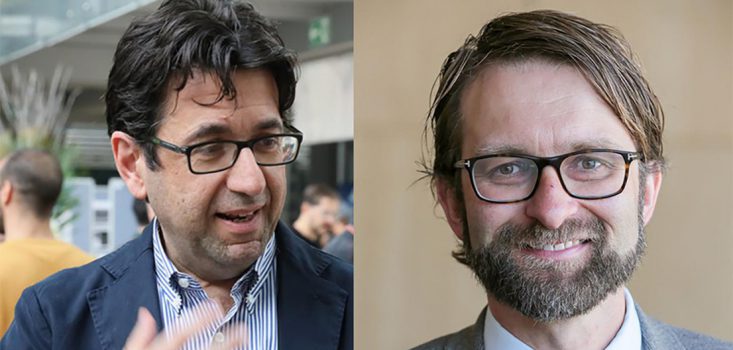In 2017, the Bertarelli Foundation made available an amount of 5 million Swiss francs to support the development of some of the most innovative research carried out at Campus Biotech in Geneva. Five projects were selected in 2018. This year, two new projects were chosen by a jury chaired by Pierre Magistretti and were announced at the Bertarelli Symposium.
Sensory feedback for upper-limb prostheses
The first is led by Silvestro Micera, EPFL’s Bertarelli Foundation Chair in Translational Neuroengineering (on the left in the picture above). It aims to develop upper limb prostheses that can not only be directly controlled by analyzing nerve impulses at the residual limb, but also generate sensory feedback to the patient. “Our goal is to understand the basic mechanisms which allow the brain to exploit the sensory feedback and to feel the new hand as part of the body. This will increase the clinical impact of our research”, says Silvestro Micera.
Attentive to the translational dimension of research projects, the jury noted that this work is, in parallel, considering the use of a non-invasive “somatosensory substitution” system, applied to the skin, which already exists off-the-shelf, and a “somatosensory restitution” system, based on the internal stimulation of nerve fibres. The combination of the two approaches expands the spectrum of patients who could benefit from such treatment.
Deep brain stimulation in a non-invasive way
The second new Catalyst project is presented by Friedhelm Hummel, EPFL’s Defitech Foundation Chair in Clinical Neuroengineering (on the right in the picture). He is developing a non-invasive brain stimulation system to improve cognitive function in patients of mild cognitive impairment or brain injury. His approach is based on temporal interference stimulation: by applying two electric fields of different frequencies to the skull via electrodes, it is possible to generate focused stimulation of deep areas of the brain. “Supporting patients suffering from MCI or TBI to keep or regain their cognitive functions is of paramount importance and will impact significantly their daily life. Temporal interference stimulation offers a promising, innovative and non-invasive novel avenue to modulate important deep structures of learning and memory-related brain networks, which could not have been addressed so far non-invasively” says Friedhelm Hummel This might avoid the need for intracranial electrodes.
For the jury, this non-invasive approach to deep brain stimulation is particularly interesting, and could have a strong impact. While many questions remain open about the feasibility of some of the proposed therapies, specialists felt that the underlying innovation was compelling.
After awarding prizes of nearly 300,000 Swiss francs to each of these two projects, the Catalyst Fund still has CHF 2.92 million available for future projects, and a further call for proposals will be made in early 2020.




